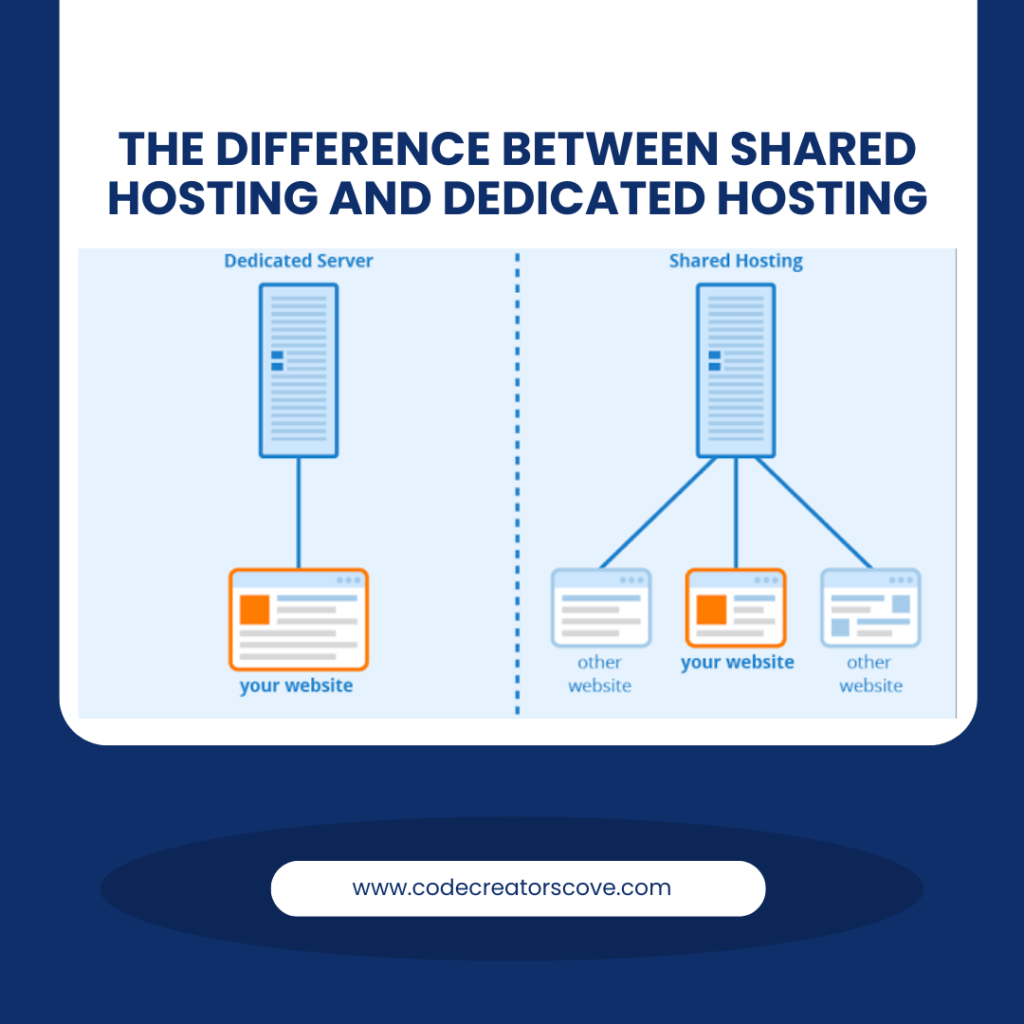Choosing the right web hosting service is crucial for your website’s success. Among the many options available, dedicated hosting and shared hosting stand out as popular choices. Let’s explore what they are, their features, and what you should consider before opting for either hosting type.
What is Shared Hosting?
Shared hosting involves multiple websites sharing a single physical server, with each website receiving a portion of the server’s resources. This setup makes shared hosting affordable and user-friendly.
Features of Shared Hosting
1. Cost-Effective: Shared hosting is usually the cheapest option, making it ideal for small websites and personal blogs.
2. Resource Sharing: Multiple websites share the same server resources, which can lead to resource constraints during high traffic periods.
3. Ease of Use: Hosting providers typically offer intuitive control panels like cPanel, simplifying website management for beginners.
4. Limited Resources: Each site has limits on CPU, RAM, and bandwidth usage, impacting performance as your site grows.
5. Basic Security: Providers implement standard security measures, but the shared environment poses risks if one site is compromised.
6. Performance Variability: Performance can fluctuate depending on the resource usage of other websites on the server.
Shared hosting suits beginners, small businesses, and personal projects due to its affordability, but its resource and security limitations make it less suitable for larger or high-traffic websites.
What is Dedicated Hosting?
Dedicated hosting provides a single website with an entire server, offering exclusive use of all the server’s resources. This option suits websites requiring high performance, enhanced security, and full control over the server environment.
Features of Dedicated Hosting
1. Exclusive Resources: Your website has full access to all server resources, ensuring optimal performance and stability.
2. Enhanced Performance: Dedicated resources result in faster load times and consistent reliability.
3. Greater Security: Dedicated servers offer robust security features, allowing for customized security protocols tailored to your needs.
4. Full Control: You have complete control over server settings, software installations, and configurations, essential for complex applications.
5. Scalability: Dedicated hosting easily accommodates increased traffic and resource demands, allowing your site to grow without performance issues.
6. Higher Cost: Due to the exclusive nature of dedicated servers, this hosting option is more expensive than shared hosting.
Dedicated hosting suits large websites, high-traffic blogs, e-commerce platforms, and businesses needing significant resources and stringent security measures.
Key Differences Between Shared and Dedicated Hosting
1. Resource Allocation: Shared hosting divides server resources among multiple websites, while dedicated hosting allocates all resources to a single website.
2. Cost: Shared hosting is more affordable, while dedicated hosting offers superior performance and features at a higher price.
3. Performance: Dedicated hosting ensures high performance with faster load times and better uptime due to dedicated resources.
4. Control: Dedicated hosting provides full control over server configurations, unlike shared hosting, which offers limited control.
5. Security: Dedicated hosting allows for advanced security measures, making it more secure than shared hosting, where security is shared among multiple sites.
Considerations for Prospective Users of Shared Hosting
1. Affordability: Shared hosting is budget-friendly and accessible for individuals and small businesses.
2. Ease of Management: Hosting providers handle most server management tasks.
3. Limited Resources: Be aware of resource limitations and be prepared to upgrade if your site grows rapidly.
4. Performance Issues: Shared resources may affect your site’s performance during peak times.
5. Basic Security Measures: Providers offer standard security measures, but shared environments pose risks.
6. Customer Support: Most plans come with customer support, though response times may vary.
Considerations for Prospective Users of Dedicated Hosting
1. Higher Costs: Expect increased expenses but enjoy improved performance and reliability.
2. Technical Expertise: Managing a dedicated server requires technical skills or reliance on managed hosting services.
3. Customization: Customize server settings, software, and security measures to suit your needs.
4. Advanced Security: Implement comprehensive security protocols to protect your site.
5. Scalability: Ensure your hosting plan can scale with your business needs.
6. Reliability: Expect higher reliability and uptime crucial for maintaining accessibility and performance.
Conclusion
This article explained the features of shared hosting as well as dedicated hosting, choose between both hosting based on your website’s requirements and budget. Shared hosting suits small websites and beginners, while dedicated hosting offers superior performance and security for larger sites and businesses. Carefully evaluate your needs to make the best hosting decision.



One thought on “The Difference Between Shared Hosting and Dedicated Hosting”